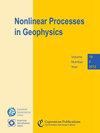气候变化下西欧的天气模式动态:可预测性、信息熵和产生
IF 2.4
4区 地球科学
Q3 GEOSCIENCES, MULTIDISCIPLINARY
引用次数: 0
摘要
摘要通过强迫耗散动力系统的信息理论,探讨了气候变化对北大西洋天气模式动力学的影响。可预测性问题首先是通过调查英国气象局产生的天气模式观测时间序列上块熵的演变来解决的,这表明在19世纪和20世纪初的观测中,可预测性随着时间的推移而增加,而这一趋势在20世纪末和21世纪初发生了逆转。英国气象局CMIP5模型在20世纪和21世纪的两种气候变化情景下的15人集合中也对这一特征进行了研究,揭示了根据所考虑的实现情况而可能发生的广泛演变,21世纪这两种情景的可预测性总体上都有所下降。还提取了信息熵产生的下界,提供了关于动力学的时间不对称程度和不可逆性的信息。英国气象局模型的分析表明,到21世纪末,信息熵的产生将增加10倍 % 在代表性碳途径RCP2.6场景中,因子为30 %–40 % 在RCP8.5中,与20世纪初相比。这使得人们可以推测,不可逆性的程度正在增加,因此在气候变化下,热量的产生和耗散也会增加,这证实了早期基于热力学熵产生分析的发现。本文章由计算机程序翻译,如有差异,请以英文原文为准。
Weather pattern dynamics over western Europe under climate change: predictability, information entropy and production
Abstract. The impact of climate change on weather pattern dynamics over the North Atlantic is explored through the lens of the information theory of forced dissipative dynamical systems. The predictability problem is first tackled by investigating the evolution of block entropies on observational time series of weather patterns produced by the Met Office, which reveals that predictability is increasing as a function of time in the observations during the 19th century and beginning of the 20th century, while the trend is reversed at the end of the 20th century and beginning of the 21st century. This feature is also investigated in the 15-member ensemble of the UK Met Office CMIP5 model for the 20th and 21st centuries under two climate change scenarios, revealing a wide range of possible evolutions depending on the realization considered, with an overall decrease in predictability in the 21st century for both scenarios. Lower bounds of the information entropy production are also extracted, providing information on the degree of time asymmetry and irreversibility of the dynamics. The analysis of the UK Met Office model runs suggests that the information entropy production will increase by the end of the 21st century, by a factor of 10 % in the Representative Carbon Pathway RCP2.6 scenario and a factor of 30 %–40 % in the RCP8.5 one, as compared to the beginning of the 20th century. This allows one to make the conjecture that the degree of irreversibility is increasing, and hence heat production and dissipation will also increase under climate change, corroborating earlier findings based on the analysis of the thermodynamic entropy production.
求助全文
通过发布文献求助,成功后即可免费获取论文全文。
去求助
来源期刊

Nonlinear Processes in Geophysics
地学-地球化学与地球物理
CiteScore
4.00
自引率
0.00%
发文量
21
审稿时长
6-12 weeks
期刊介绍:
Nonlinear Processes in Geophysics (NPG) is an international, inter-/trans-disciplinary, non-profit journal devoted to breaking the deadlocks often faced by standard approaches in Earth and space sciences. It therefore solicits disruptive and innovative concepts and methodologies, as well as original applications of these to address the ubiquitous complexity in geoscience systems, and in interacting social and biological systems. Such systems are nonlinear, with responses strongly non-proportional to perturbations, and show an associated extreme variability across scales.
 求助内容:
求助内容: 应助结果提醒方式:
应助结果提醒方式:


